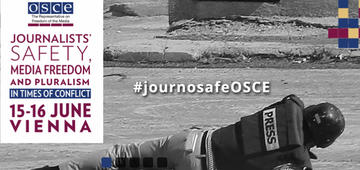
On the 15th and16th June 2015, OSCE organizes the conference “Journalists' Safety, Media Freedom and Pluralism in Times of Conflict”
Link: OSCE
Journalists’ safety is deteriorating rapidly throughout the OSCE region, members of the media covering conflicts is particularly exposed. The statistics say it all: 1,200 journalists have been killed since 1992 and nearly 40% of these victims covered conflicts around the world.
In 2014, 61 journalists lost their lives as a result of their profession, many of them reporting from conflict zones around the world. This deadly trend has continued into 2015.
The OSCE region is no exception; journalists reporting from armed conflicts have been attacked and threatened. And journalism itself has suffered from the powers of propaganda and its unabated rage in conflict zones.
Disinformation needs to be eradicated, journalism needs to be restored. Attacks on journalists should be part of the past, journalists’ safety should be a given at all times, not least in conflict zones.
Even though each conflict presents unique challenges for the media and the countries affected, it is important that the lessons learned and positive practices be shared as a means to help preserve media freedom.
The OSCE Representative on Freedom of the Media is gathering media experts and journalists from around the world for a two-day conference Journalists’ safety, Media Freedom and Pluralism in Times of Conflict. It aims to:
- examine and review the current situation relating to the safety of journalists reporting from conflicts;
- share concerns and best practices;
- initiate the drafting of recommendations to the governments on ways to improve journalists' safety in conflict zones in the OSCE area.
More information on the conference is available at: www.osce.org/fom/151466.
This publication has been produced within the project European Centre for Press and Media Freedom, co-funded by the European Commission. The contents of this publication are the sole responsibility of Osservatorio Balcani e Caucaso and its partners and can in no way be taken to reflect the views of the European Union. The project's page

 Journalists’ Safety, Media Freedom and Pluralism in Times of Conflict
Journalists’ Safety, Media Freedom and Pluralism in Times of Conflict




 All the contents on the Osservatorio Balcani e Caucaso website are distributed with a
All the contents on the Osservatorio Balcani e Caucaso website are distributed with a 